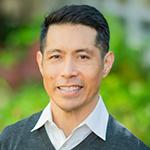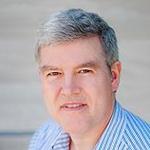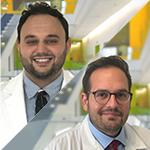
Photo by Susan Merrell 2020
Eleven investigators and teams were awarded grants in support of cancer research projects in the spring 2023 cycle of the UCSF Resource Allocation Program (RAP). Funded by various agencies across UCSF, the awards span a range of topics from theranostics to molecular imaging to immunotherapy response prediction.
RAP is a campus-wide program that bi-annually facilitates intramural research funding opportunities and seeds high-quality, high-impact, timely research. The program offers many benefits for investigators and campus agencies, including a single application, a streamlined review process, and access to funding that has a typical funding rate around 40 percent.
Read more about the recent awardees and their cancer research projects below.

Mark Magbanua, PhD
Professional Researcher, Laboratory Medicine, UCSF
Project: Elucidating the clinical significance and biology of cell-free DNA shedding in high-risk early-stage breast cancer
Award Mechanism: Under-represented Faculty in Clinical & Translational Research
Can you describe the focus of your project in a few sentences?
Cell-free DNA, which includes all the DNA molecules shed into circulation by dying hematopoietic and tumor cells, is a promising liquid biopsy biomarker. The proposed study aims to examine the biology of cfDNA shedding and its clinical significance in breast cancer patients receiving neoadjuvant chemotherapy in the ISPY2 trial. Findings from this study may help maximize and fine-tune the use of cfDNA as a biomarker of response and survival in the neoadjuvant setting.
What motivated you to pursue this particular project?
I am pursuing this project because I am interested in developing liquid biopsy-based biomarkers for predicting patient outcomes. Liquid biopsy is less invasive than tissue biopsy and can be repeated over time to monitor tumor burden and treatment response. I have been studying circulating tumor DNA (cfDNA exclusively shed by tumors), and I and others have demonstrated its clinical significance. In contrast, the clinical impact of cfDNA concentration in patients with early-stage breast cancer has yet to be studied in detail.

Yao Wang, PhD
Postdoctoral Scholar, Diabetes Center, UCSF
Project: Restoring the effector T cells-induced cytotoxicity in pancreatic ductal adenocarcinoma
Award Mechanism: Mentored Scientist Award in Pancreas Cancer
Can you describe the focus of your project in a few sentences?
The focus of my project is to investigate the immunosuppressive mechanisms within the tumor microenvironment of pancreatic ductal adenocarcinoma (PDAC). Specifically, I aim to identify and target factors secreted by cancer-associated fibroblasts (CAFs) that inhibit the cytotoxic function of effector T cells in PDAC. By understanding these mechanisms, I hope to develop strategies to restore the effector T cells' ability to effectively target and eliminate cancer cells in PDAC.
What motivated you to pursue this particular project?
I was motivated to pursue this project due to the urgent need for innovative and effective therapies for PDAC, which is a devastating disease with limited treatment options. By unraveling the immunosuppressive factors in the tumor microenvironment, I believe we can potentially revolutionize PDAC treatment and contribute to advancements in cancer immunotherapy. This project aligns perfectly with my passion for oncology and my desire to make a significant impact on cancer research and patient outcomes.

Robert Bok, MD, PhD
Associate Professor of Radiology, UCSF
Project: Development of New Hyperpolarized C-13 MRI Tools for Measuring Neuroendocrine Cancer Aggressiveness and Therapeutic Response
Award Mechanism: Team Science Grant
Can you describe the focus of your project in a few sentences?
The goal of this project is to develop a new molecular imaging approach, using hyperpolarized (HP) 13C-MRI tools to quantitatively, non-radioactively, and simultaneously measure metabolic activity and perfusion in neuroendocrine tumors (NET). New HP13C-pyruvate+urea MRI methods will be developed and added to conventional anatomical MRI to rapidly assess tumor aggressiveness and detect early tumor response, following targeted therapy for gastro-intestinal NET patients.
What motivated you to pursue this particular project?
HP13C-MRI is a promising non-radioactive molecular imaging technique which interrogates fundamental enzymatic steps in tumor metabolism in real-time, and has great potential for enhancing the characterization and monitoring of cancers with complex, heterogeneous phenotypes, that are common among NET patients.

Susan Noworolski, PhD
Professor of Radiology and Biomedical Imaging, UCSF
Project: The Feasibility of Using Multiparametric MRI Cancer Risk Maps to Guide Focal HIFU Therapy for Prostate Cancer
Can you describe the focus of your project in a few sentences? What motivated you to pursue this particular project?
I am grateful for this family support award to help my lab regain research focus after my significant family caregiving needs. Most of us will face such challenges at some point in our lives and as cancer center members, I feel it’s important to remember that our patients and their families and caregivers are facing such obstacles on a daily basis.
The idea for this grant is a testament to collaborations. My lab, with first author, Dr. Matthew Gibbons, recently published a paper culminating years of research in characterizing multiparametric MRI measures of the prostate, with correlations to detailed histopathology with Dr. Jeffry Simko, to create MRI maps of prostate cancer and of aggressive prostate cancer. Our collaborator and co-author, Dr. Peter Carroll, recommended we talk with Dr. Hao Nguyen, who has been providing focal prostate cancer treatment to men with prostate cancer via high intensity focused ultrasound (HIFU) therapy. We want to ensure patients have the best focal treatment possible, so determining if our cancer risk maps can help guide HIFU therapy was a logical next step with this research.
The focus of this project is to attain pilot and feasibility data to determine if there is promise in using our MRI cancer risk maps to aid focal HIFU therapy for prostate cancer and to generate the critical data to design a larger study in this area. We will utilize data from a cohort of patients with prostate cancer who have received HIFU treatment and follow-up biopsy and determine if the cancer risk maps could have predicted successful therapy versus residual/recurrent cancer, both via treatment coverage and by evaluating the MRI signatures in the cancer and in surrounding tissues.

Robert Flavell, MD, PhD
Associate Professor of Radiology, UCSF
Project: Treatment of Prostate Cancer using Thorium-227 Alpha-Radioimmunotherapy Targeting CD46
Award Mechanism: Pilot for Established Investigators
Can you describe the focus of your project in a few sentences?
The goal of this project to develop a new treatment for prostate cancer using targeted alpha therapy against CD46 using radiolabeled cancer specific antibodies. The treatment method will be developed and tested in preclinical murine prostate cancer models. Because of high CD46 expression in advanced prostate cancer, we expect this type of therapy to have particular impact in advanced, treatment refractory types of prostate cancer, where we observe high levels of CD46 expression.
What motivated you to pursue this particular project?
The development of CD46 targeted theranostics has been an area of interest of my laboratory for some time. One potential advantage of the strategy we are proposing is that it produces Radium-223 as a byproduct of the decay process. Radium-223 is itself a therapeutic isotope for treatment of prostate cancer bone metastases, suggesting that this method may have particular efficacy for men with metastatic disease in the bones.

Michael McManus, PhD and Neil Tay, PhD
Diabetes Center, UCSF
Project: Relaying T cell interactions
Award Mechanism: Pilot for Established Investigators
Can you describe the focus of your project in a few sentences?
Our lab recently developed a novel and broadly applicable barcode transfer technology that we call ‘Relay’, that can be used to track cell interactions with unparalleled throughput. The essence of the project lies in enhancing the Relay platform by integrating it with existing single cell sequencing pipelines and performing various proof-of-concepts. By combining these technologies, we study immune cell interactions at the single cell level, making possible single cell functional genomic assays such as intercellular CRISPR screening with single cell resolution. We believe this technology will pave the way for new discoveries in the field of single-cell immunology.
What motivated you to pursue this particular project?
Cell-cell interaction is a one of the most fundamental biological mechanisms by which cells communicate in a wide range of processes. Although single cell genomics has been at the forefront of many impactful discoveries in recent years, there are limited cell-cell interaction assays that are compatible with existing high-throughput methods such as genome-wide CRISPR screening and single cell RNA sequencing. We believe that Relay has the potential to unlock a wide array of analyses and studies that were previously unattainable.

Annette Molinaro, PhD
Professor of Neurological Surgery, UCSF
Project: Investigating the association between blood-based immune profiles and immunotherapy response in glioblastoma patients
Award Mechanism: Pilot for Established Investigators
Can you describe the focus of your project in a few sentences?
A high priority, yet unresolved, clinical problem in GBM patient management is the prediction of immunotherapy response. There are no comprehensive standardized methods to assess the effect of the systemic immune system on response to immunotherapies. Our RAP study will employ our advanced DNA methylation-based approach for high-resolution immune profiles in peripheral blood to achieve a rapid non-invasive blood test to discriminate responders from non-responders in a completed PD1/PD-L1 clinical trial.
What motivated you to pursue this particular project?
We were motivated to pursue this project because most glioma patients fail to respond or develop resistance to immune checkpoint blockade inhibitor treatments despite durable responses in many other cancers. Intensive efforts are underway to identify biomarkers that discriminate between responders and non-responders. Most current research has focused on tumor immune features; however, the systemic immune system is essential for a successful anti-tumor response. Thus, this project is relevant and impactful to cancer because it addresses an urgent clinical need for non-tumor biomarkers to predict robust responses to immune therapy.

Tomi Nano, PhD and Dante Capaldi, PhD
Dept. of Radiation Oncology, UCSF
Project: Smartphone-Based Surface Guidance in Radiation Therapy as an Emerging Paradigm in Personalized Cancer Care
Award Mechanism: Pilot for Early Career Investigators
Can you describe the focus of your project in a few sentences?
The focus of this project is to develop a mobile-based application for cancer centers that do not have access to standard-of-care technology required for effective radiation therapy. This is particularly important for left-side breast cancer patients undergoing radiotherapy which involves multiple deep inspiration breath hold (DIBH). Current technology is not accessible due to cost and a high degree of complexity that requires more training, education, and quality assurance programs. Our team was the first to show and investigate low-cost alternatives to monitor respiratory motion that utilize Light Detection and Ranging (LiDAR) capabilities available on most smartphones. In an effort to improve radiation therapy globally, this project is focused on further developing and facilitating the translation of novel easy-to-use, low-cost smartphone platforms to centers that currently do not have access to effective treatment.
What motivated you to pursue this particular project?
As a clinician scientist in the medical physicist domain, my co-PI (Dr. Dante Capaldi) and I are often reminded through clinical practice that the current technology is not optimal for every patient, and furthermore, it is not accessible to every clinic. UCSF has world-class facilities and access to technology that offer the best standard of care for their patients. We are inspired and motivated by the high quality of cancer care that is offered at UCSF. Our goal is to help enable the translation of effective treatments, and in radiation therapy the means making the technology more accessible, so that all cancer patients will benefit.

Yan Li, PhD
Associate Professor of Radiology, UCSF
Project: Automated MR Spectroscopic Imaging for Improved Glioma Evaluation Clinical Workflow

Helen Stankiewicz Karita, MD
Associate Professor of Medicine, UCSF
Project: Burden and Correlates of Anal HSIL Among Renal Transplant Recipients
Award Mechanism: Pilot for Established Investigators

Jennie Taylor, MD, MPH
Associate Professor of Clinical Neurology, UCSF
Project: Biomarkers of environmental exposures related to glioma risk among firefighters and controls in the UCSF Adult Glioma Study (AGS)
Award Mechanism: Pilot for Established Investigators